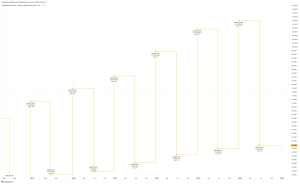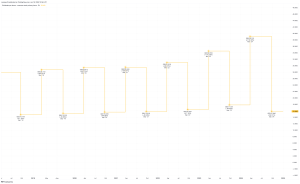Parking money in UK stocks has proven to be a great way to build wealth over time. Yet the rising cost of living means many retail investors have little-to-no money to invest, or even save for a rainy day.
According to Comparethemarket.com, more than one in 10 people (12%) have zero savings today. This figure rises to 16% for Gen X (those aged 43-58).
But with inflationary pressures easing and wages rising strongly, saving for the future could be getting easier from this point. So it’s never too late to start building wealth for retirement. And for those aged 40+, investing in UK shares, funds and trusts could be the best way to create long-term wealth.
Cash dangers
Let’s say that 40 year-old can now manage to save £300 a month in a 5%-yielding Cash ISA. By the time they hit their State Pension age of 68, they’d have £219,126 in the bank.
Assuming they drew down 4% of this a year, they’d have an annual income of £8,765. Even with the State Pension combined, this is unlikely to give them the £43,100 a year that the Pensions and Lifetime Savings Association (PLSA) says is required for a comfortable retirement lifestyle.
It may not even give them the £31,300 a year the PLSA predicts is needed for a moderate lifestyle.
Investing in stocks
It’s my belief that this 40 year-old may be better off thinking about investing their cash in a mix of FTSE 100 and FTSE 250 shares with a Stocks and Shares ISA. These indexes have delivered a long-term annual average return of 7% and 11% respectively.
Past performance isn’t a reliable guide to the future. But let’s say they continue to perform strongly in the coming decades. If that person invested £300 a month equally between a FTSE 100 and FTSE 250 tracker fund they would, after 28 years (and excluding trading fees) have a healthy £452,491 sitting in their Stocks and Shares ISA.
That’s more than double they’d have by putting their monthly savings in a 5.18%-paying Cash ISA.
Applying that 4% withdrawal rate again, they’d have a yearly passive income of £18,100 to live off in retirement, excluding the State Pension.
A fund to consider
Another good option could be to think about a global fund like the HSBC MSCI Global ETF (LSE:HMWO). As the name implies, this exchange-traded fund (ETF) invests in a range of UK stocks along with those from international stock exchanges.
It not only offers exposure to different industries, it also gives investors a chance to capitalise on opportunities in other regions while spreading their risk still further.
Some of the largest holdings here include US tech giants Nvidia, Microsoft and Apple. The fund therefore provides investors a chance to profit from ongoing global digitalisation and phenomena like artificial intelligence (AI) and cloud computing.
The ETF’s 10-year average annual return here’s a healthy 9.9%. I think it’s a great long-term fund to consider, even though returns could disappoint during economic downturns.
This post was originally published on Motley Fool







